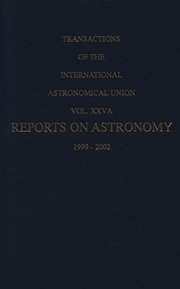Article contents
Is Astronomical Research Appropriate for Developing Countries?
Published online by Cambridge University Press: 25 April 2016
Abstract
An unproductive 45-cm astronomical telescope, given by JICA (Japan) to Sri Lanka, raises general questions as to the reasons for unproductive pure science in developing countries. Before installation, site, maintenance, and scientific objectives were discussed. The facility was launched with a conference organised by the UN Office for Outer Space Affairs. Unfortunately, no research or significant education has resulted after four years. The annual operating cost is U.S. $5000 per year, including salary for a trainee, maintenance, and a modest promotional programme. Comparison with a similar installation in Auckland suggests lack of funding or technical competence do not explain the failure in Sri Lanka. The facility in New Zealand, on the roof of Auckland University’s Physics Department, has a slightly smaller budget but has led to modest but useful research and teaching. Lack of financial backing and expertise are often blamed for weak science in developing countries, but examination shows most of these countries have adequately skilled people, and plenty of resources for religion and military. General lack of motivation for science appears to be the principal reason. This lack of interest and highly inefficient bureaucracies are common to scientifically unproductive countries. They mostly lack the cultural and philosphical base of the European Renaissance that motivate the pursuit of modern science, an activity that violates human preferences. There are excellent facilities (ESO, SAAO, Cerro Tololo, and GONG) in some of these same countries, when administered from the West.
- Type
- Section 5: Small Telescopes or Internet Access?
- Information
- Copyright
- Copyright © Astronomical Society of Pacific 2001
References
- 1
- Cited by




